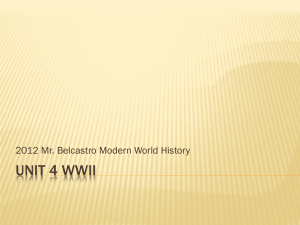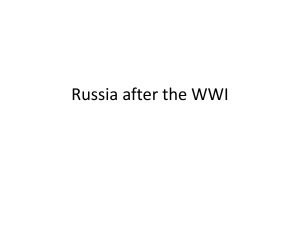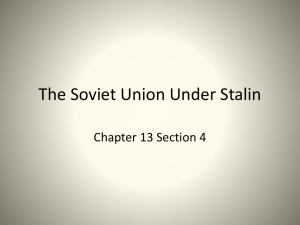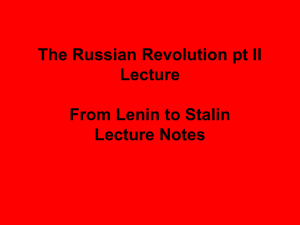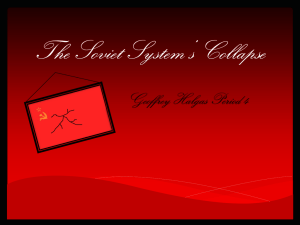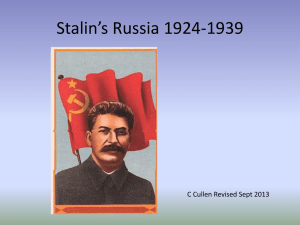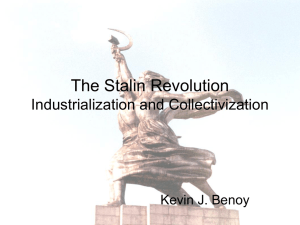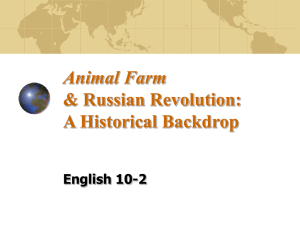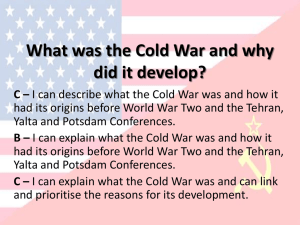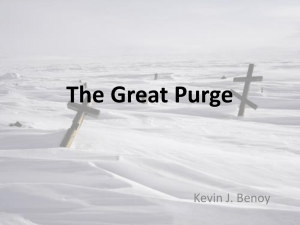stalin
advertisement
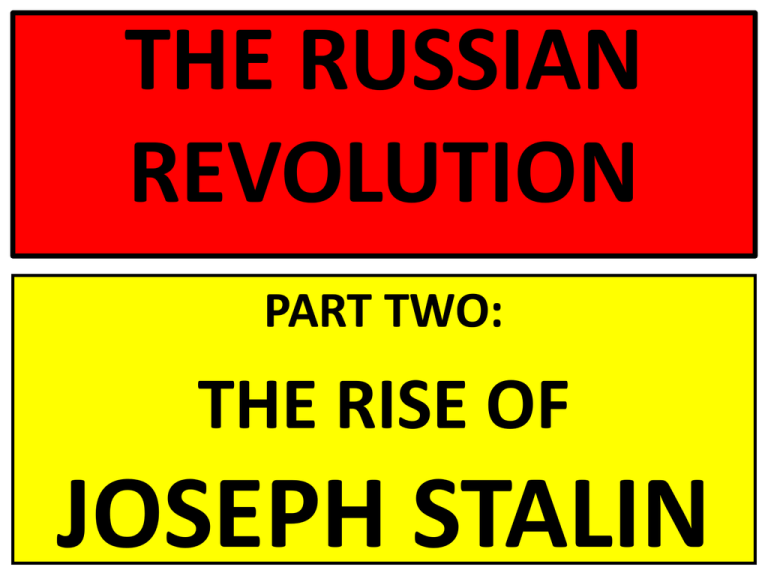
THE RUSSIAN REVOLUTION PART TWO: THE RISE OF JOSEPH STALIN Essential Question: What were the positive and negative aspects of Joseph Stalin’s rule over the Soviet Union? In 1917, Vladimir Lenin led the Bolsheviks in an overthrow of the Russian government Lenin transformed Russia into the Soviet Union, the world’s first socialist government and created the Communist Party to rule the nation THE SOVIET UNION’S NEXT LEADER Lenin would not rule the Soviet Union for long; his health declined when he suffered a stroke in 1922 Several of his followers all wanted to replace Lenin after his death; one of them was a notorious thug named Joseph Stalin, who helped Lenin rise to power Lenin died in 1924; Lenin’s death led to a struggle for power in the Soviet Union By 1927, Joseph Stalin outmaneuvered (and sometimes murdered) his rivals and gained control of the Soviet Union Stalin quickly created a totalitarian state; in a totalitarian state, the government and its leader have total control of the peoples’ lives TOTALITARIAN: A DEFINITION TOTALITARIAN: A political regime based on subordination of the individual to the state. There is strict control of all aspects of life of the nation’s citizens, especially by forceful measures (such as censorship, brutal police action, torture, and murder) THE COMMUNIST PARTY Stalin was a totalitarian dictator who transformed the USSR into a police state THE COMMUNIST PARTY Stalin led the Great Purge to eliminate potential rivals in the Communist Party (Stalin executed possibly as many as 20 million Russians) Stalin used propaganda and censorship to control information and began education programs to teach communist ideals and loyalty to Russian children The Five Year Plans Stalin created a series of Five Year Plans to overhaul the Soviet economy The Five Year Plans Stalin seized control of the economy and set high production quotas on steel, coal, oil, and electricity Stalin’s Five Year Plans dramatically improved Soviet industry and helped modernize the military Collectivization Stalin seized 25 million acres of private farms and combined them into large governmentcontrolled collective farms Collectivization 90% of all peasants lived and worked on collective farms Collectivization 90% of all peasants lived and worked on collective farms Collectivization 90% of all peasants lived and worked on collective farms Collectivization Agricultural production improved in the USSR, but farming was inefficient and peasants resented having their land taken from them Individual Rights Stalin declared men and women equal in the USSR; Women’s rights increased as women could vote and join the Communist Party Women were expected to work in factories and on collective farms like men Stalin attacked all religion and created a nation of atheists (no emphasis on religion); Stalin ordered destruction of Orthodox churches and Jewish synagogues STALIN: A MASS MURDERER An important thing to know about Joseph Stalin is that he was as murderous as any dictator in history Stalin was also ruthless in protecting his own power and ultra-paranoid of those around him Stalin would “purge” his enemies, both real and imagined, executing anyone he thought was “disloyal” or a threat to him JOSEPH STALIN: COMPLETELY RUTHLESS “Gratitude is a sickness suffered by dogs.” “I trust no one, not even myself.” “The Pope? How many divisions has he got?” “Death is a solution to all problems. No man, no problem.” “In the Soviet Army, it takes more courage to retreat than advance.” “The death of one man is a tragedy. The death of millions is a statistic.” “I believe in one thing only, the power of human will.” THESE QUOTES BY STALIN SHOULD ILLUSTRATE THAT HE WAS AN EXTREMELY COLDHEARTED, IMMORAL, AND RUTHLESS MAN LENIN AND STALIN: UTTERLY RUTHLESS Lenin did anything to achieve his goals, including bank robberies to fund the Bolsheviks and ordering the deaths of about 300,000 people who stood in his way As ruthless as Lenin was, Stalin was far worse; by the time his life was over, Stalin had destroyed the lives of over 20 million Russians through imprisonment, torture, slavery, and murder CULT OF PERSONALITY Stalin established a cult of personality to keep control of the Soviet Union A cult of personality is similar to hero worship A cult of personality arises when an individual uses mass media and propaganda to create an idealized and heroic public image, often through unquestioning flattery and praise OFFICIAL INFO ABOUT THE COMMUNIST PARTY Communists are the leader of the working people. No one has special privileges and all are equal. SECRET REALITY OF THE COMMUNIST PARTY In reality, only half the working people were members of the Communist Party. Stalin killed or imprisoned any Party member he thought was disloyal. Leaders lived in privileged luxury. OFFICIAL INFO ABOUT THE FIVE YEAR PLANS Stalin’s plans will enable the USSR to catch up with the rest of Europe. The USSR will be just as strong in terms of industrial power. Under Stalin’s direction, Soviet industry tripled its output. SECRET REALITY OF THE FIVE YEAR PLANS Anyone who went against Stalin’s plans were executed or imprisoned. To meet the high numbers of Stalin’s demands, workers focused on speed, not quality. The quality of products from Soviet factories fell terribly. OFFICIAL INFO ABOUT THE COLLECTIVE FARMS Land will be taken away from wealthy landowners and distributed equally among the peasants. Collectivization will make farming more productive and efficient. SECRET REALITY OF THE COLLECTIVE FARMS Anyone who opposed collectivization was punished: more than 12 million were executed and more sent to slave camps. At first, collectivization did not work and 5 million Russians died in the resulting famine. OFFICIAL INFO ABOUT INDIVIDUAL RIGHTS Soviet citizens had full rights: of speech, assembly, press, religion. Women had equal roles in Soviet society. Minority groups enjoy equal rights. SECRET REALITY OF INDIVIDUAL RIGHTS In reality, Stalin controlled every aspect of Soviet life; there was very little freedom. Religion was wiped out in the USSR. Minorities were deported, killed, or enslaved.
